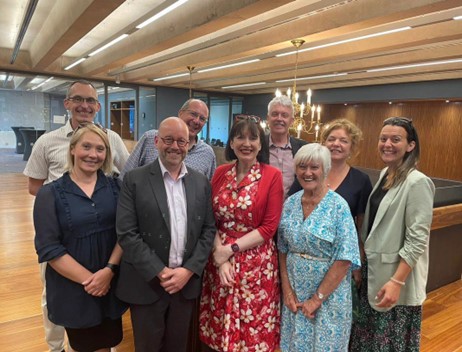As we reflect upon progress in the previous quarter, I want to thank Suzy Lishman and the team at the Royal College of Pathologists for arranging such a successful conference on 17 May – thank you again for all the work that went into making the day enjoyable, interactive and possible. It was inspiring to hear from medical examiners and officers about their excellent work with other healthcare organisations and GPs to make rollout in the community possible. Please also remember my report for 2022, which we published on the day.
I was delighted to visit the medical examiner office at Surrey and Sussex Healthcare NHS Trust earlier in the month. I could see just how well their processes were working and it was a joy to meet such a positive team.
As we get nearer to the statutory system, DHSC is continuing work with NHS England, colleagues from Wales, and other government departments to complete necessary tasks and communications. This will prepare the ground for commencing the statutory system from April 2024. One example is the digital MCCD which you can read about below. NHS England communications such as the primary care bulletin have also emphasised unequivocally that all deaths will be scrutinised by medical examiners by April 2024. As I mentioned at the annual conference, I expect the processes of medical examiner scrutiny in the statutory system will overall be very much the same as they are now. We have, as far as possible, ensured that expectations for the non-statutory period reflect what will be needed in the statutory system.
I am sure many of you will be taking a well-deserved summer break. Whatever your plans, I hope you have a wonderful summer. When we return, we will have six months before April 2024 is upon us, and it will be important to maintain momentum. I am excited to be sharing this journey with you all.
Thank you once again for your consistent efforts and hard work.
Dr Alan Fletcher, National Medical Examiner
GP Practice Managers’ study day
Ashford and St Peter’s Hospitals NHS Foundation Trust medical examiner office hosted a collaborative event with more than 30 GP practice managers and administrators to help support community roll-out. The day brought primary and secondary care workers together, and resulted in extremely positive feedback, with another event already planned for later in the year. It marked an important step forward in collaborative working with GP and community partners in the South East region.
During the event, sessions and workshops were provided by register offices, the integrated care system digital team, and Ashford and St Peter’s medical examiner office. The event successfully built good connections between partners in the community.
We know that medical examiner offices across England and Wales are finding many innovative ways to engage with other healthcare organisations. Please do keep regional and national medical examiner offices informed of your progress, so that learning can be shared in regional forums and future bulletins.
Podcast – GPs and medical examiners
Our first medical examiner podcast is now available, exploring how GPs and medical examiners can work together to improve the experience of bereaved people. The podcast also explores the range of benefits that medical examiners can bring to GP practices by
working with them in the period before medical examiner examiners become part of the statutory death certification process.
Where relevant, please share the link to the podcast in any regular communication you have with local GP practices.
Implementation in Wales
The Medical Examiner Service for Wales is continuing its build-up to be ready for the statutory system from April 2024. We are working in partnership with teams and organisations through local stakeholder groups attached to each medical examiner office, as well as engagement with primary care groups and individual GPs through an interactive online event. These help ensure the service will fit with other systems and structures, with the least amount of disruption. They also help us understand issues and restrictions that apply to each part of the scrutiny and death certification process, which also helps improve day-to-day operational delivery, which, in turn, helps improve the experience of bereaved people.
Newly appointed medical examiners and officers are providing capacity necessary to meet increasing workload. Utilising virtual meetings and the case management system, we can maximise capacity across Wales as local demand changes on a daily basis.
The end of quarter one saw the service begin to report themes and trends at a care provider level and also aggregate up to an all-Wales level. This will feed into clinical quality and patient safety systems locally and nationally, as well as the coronial service to help ensure all opportunities for improvement are identified as part of a coherent, system-wide approach.
Good practice series – dementia
We are pleased to announce that the Royal College of Pathologists has published the latest of the National Medical Examiner’s good practice series. This latest paper includes information and recommendations for medical examiners regarding dementia.
New and digitised Medical Certificate of Cause of Death
When medical examiners become part of the statutory death certification process, Medical Certificates of Cause of Death (MCCDs) will need to be countersigned by a medical examiner before the death can be registered. This means a new MCCD form is required, and DHSC are taking the opportunity to provide an online version of the new form.
Workshops and discussions have been taking place between government departments regarding the requirements of the new form. The online form, besides reflecting the new MCCD rather than the current one, will also need to meet government digital standards.
DHSC has commissioned NHS Business Services Authority to develop a new and digitised MCCD for England and Wales. DHSC is working with stakeholders, and it is anticipated that the new and digitised MCCD will be introduced alongside the full set of death certification reforms planned from April 2024. If your role involves completing MCCDs and you are interested in supporting the user research, please contact UserResearch.DCR@nhsbsa.nhs.uk.
Trainng and events
To date 1,997 medical examiners have been trained and over 632 staff have completed the medical examiner officer training. It was particularly good to experience a face-to-face medical examiner training session on 14 June. We would like to thank all the faculty facilitators who give their time to support the training, without whom this would not be a success. Future training sessions are arranged.
There were 230 delegates at the third annual medical examiner conference on 17 May. The National Medical Examiner’s Report for 2022 was launched and William Vineall, Director of NHS Quality, Safety and Investigations at DHSC, mentioned the proposed new digital MCCD, planned to coincide with commencing the statutory medical examiner system. This will include fields for medical examiners to confirm the causes of death, underlining how medical examiners underpin wider reforms to the statutory death certification process.
Contact details
We encourage you to continue to raise queries with us and share your thoughts on the introduction of medical examiners, through the contacts list.
The page contains contact details for the national medical examiner’s office, the medical examiner team in Wales, and regional medical examiner contacts in England.
Further information
Further information about the programme, including previous editions of this bulletin, can be found on the national medical examiner webpage.
NHS Wales Shared Services Partnership also has a web page for the medical examiner system in Wales.



